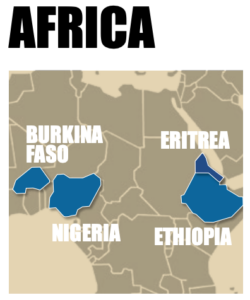World regions where persecution will increase this year

If Covid taught us one thing, it was that both governments and religious majorities around the world used the pandemic as cover to persecute Christians. In many countries, believers in Christ faced unprecedented attacks during 2020 and 2021 but it is expected to increase again in 2022.
Most Christians in areas of persecution, lost their livelihoods due to lockdowns that wreaked havoc on economies. With the world focused on the pandemic, much of the persecution went unreported, except in vigilant Christian media outlets like Metro Voice.
‘Rising tide’
‘In many nations, we see a rising tide of intolerance towards Christians, accompanied by a rise in violence,’ says Paul Robinson of Release International.
Robinson says Islamist militants in Africa are becoming more aggressive as they attempt to “drive Christians from the land.”
According to Open Doors, persecution has reached its highest levels in 30 years.
“Every country in the top 50 is ranked as experiencing ‘very high’ or ‘extreme’ levels of persecution. Outside of the top 50, an additional 26 countries are categorized as having ‘very high’ or ‘high’ levels of persecution. The increase signifies a greater “pressure in all areas of life for persecuted Christians.”
West Africa is expected to be a hotspot for persecution of Christians this year, according to the newly released Persecution Trends report from Release International. The organization pointed to several countries of concern.
DONATE: Support Metro Voice bringing you this news.
Metro Voice reports extensively on persecution. To read past stories just type in the country’s name in our search bar.
 Sub-Saharan Africa. Islamist extremists are gaining ground in the Sahel region of sub-Saharan Africa. In Burkina Faso, jihadists targeted Christians in the northern part of the country in 2021, forcing churches to close and meet in secret. Attacks ranged from bombings, killings, kidnappings and school burnings to assaults on religious leaders and places of worship.
Sub-Saharan Africa. Islamist extremists are gaining ground in the Sahel region of sub-Saharan Africa. In Burkina Faso, jihadists targeted Christians in the northern part of the country in 2021, forcing churches to close and meet in secret. Attacks ranged from bombings, killings, kidnappings and school burnings to assaults on religious leaders and places of worship.
The Global Terrorism Index said the faction behind most of the killings is the Islamic State in the Greater Sahara.
Nigeria. Attacks by Boko Haram terrorists, IS fighters and Fulani militia continued throughout 2021. These attacks could escalate in 2022 as political campaigning gets underway ahead of the 2023 general election. In the past, attacks by Boko Haram and Fulani extremists have increased during election periods. Over 50 Christian villages have been wiped out by attacks leaving thousands homeless. In certain areas, the violence has been described as a genocide against Christians while Western news outlets remain silent on the slaughter. Metro Voice has covered the attacks extensively in recent years.
Nigerian Christians have expressed the wide-held view that the Biden administration has abandoned its effort to work on their behalf.
Afghanistan . 2021 was a tumultuous year for Afghanistan, with the Taliban taking over the country after a bungled U.S. retreat left Christians exposed. “In 2022, there is a very real threat of higher levels of violent persecution in Afghanistan,” said Robinson. “Our partners tell us that Christians who are unable to follow the outward forms of Islam, such as praying at the mosque and saying the shahada, the Islamic profession of faith, will stand out more clearly. This increases their vulnerability to persecution and the pressure on them to conform.’
. 2021 was a tumultuous year for Afghanistan, with the Taliban taking over the country after a bungled U.S. retreat left Christians exposed. “In 2022, there is a very real threat of higher levels of violent persecution in Afghanistan,” said Robinson. “Our partners tell us that Christians who are unable to follow the outward forms of Islam, such as praying at the mosque and saying the shahada, the Islamic profession of faith, will stand out more clearly. This increases their vulnerability to persecution and the pressure on them to conform.’
As Metro Voice reported at the end of 2021, a majority of the country is starving with over 1.5 million children at risk of death. This creates desperate situations with the Taliban looking for minorities to blame. Expect Christians and other religious minorities to take the brunt of this.

North Korea. Food insecurity is a major worry in North Korea, where observers warn famine is looming once again. As winter tightens its grip, many could face imminent starvation. In the 1990s, up to 3.5 million North Koreans died of hunger. According to some estimates, more than 10 percent of the population lost their lives.
Further instability in the country could lead to increased persecution in what already is one of the most hostile countries to Christianity in the world.
Negotiations with North Korea, a top priority in the Trump administration, have faltered or halted in the first year of the Biden administration. Many foreign policy experts believe that less scrutiny of the regime will allow it to further increase the persecution of Christians who risk death for owning a Bible or other Christian literature.
India. Attacks against Christians are rising, and more states are imposing anti-conversion laws. This comes as growing numbers of the Indian underclass, the Dalits, are turning to Christianity. Ultra-Hindu nationalism is on the rise in India against both Muslims and Christians. Militant Hindus have called for religious conversion from Hinduism to be made illegal across the country. Several states already have passed anti-conversion laws. But Christians are also at tremendous risk in areas of the country controlled by Muslim majorities, typically closer to Pakistan.
–Alan Goforth and Dwight Widaman | Metro Voice








